第二讲 辞格的翻译
修辞格翻译

拟人(Personification) 拟人(Personification)
拟人就是把动物和没有生命的事物当成有思想感 情的人类来描写,甚至让它们具有人的行为。这 些事物可以是无生命的实体,还可以是抽象的概 念, 如:a smiling moon(微笑的月亮),a 如:a moon(微笑的月亮),a crying city(哭泣的城市),to strangle justice city(哭泣的城市),to (扼杀正义)等。 英汉两种语言中都有这种修辞手法,在翻译的时 候一般可采取直译的方法再现原文的生动形象。
3)We must work to live, and they give us such mean wages that we die. (Oscar Wilde, The Young King) King) 我们不得不做工来养活自己,可是他们只给我们那么少的 工钱,我们简直活不下去。 (巴金译) 4)Nay, he said—yes you did—deny it if you can, that said— did— you would not have confessed the truth, though master had cut you to pieces. (Henry Fielding, The History of Tom Jones, A Foundling) Foundling) 他还说——你是这么说的,有本事你就抵赖好了。你还说, 他还说——你是这么说的,有本事你就抵赖好了。你还说, 就是老师把你剁成肉酱,你也绝不招出实情。(萧乾译)
修辞格翻译(2 修辞格翻译(2)
转喻(Metonymy) 转喻(Metonymy)
转喻就是借与人或事物有关联的事物来指代人或事物。根 据上下文,既可以直译,也 可以意译。首先请看下面的例句: 1)Is life so dear, or peace so sweet, as to be purchased at the price of chains and slavery? 生命当真如此可贵,和平当真如此甜蜜,竟值得以枷锁和 奴役为代价去换取吗? 在这里,chains(枷锁)指代“束缚”,直译既可以保留 在这里,chains(枷锁)指代“束缚”,直译既可以保留 原文的感染力,又可以为读者理解。但并不是在所有情况 下直译都是最好选择,例如:John 下直译都是最好选择,例如:John spent many years in chains beforehe saw his family again. Chains 在这里指 代“囚禁”,若译成“约翰在枷锁中过了许多年才又见到 他的家人”则嫌不够自然,可意译成“约翰在监牢里呆了 很多年才又见到他的家人”。
辞格简释
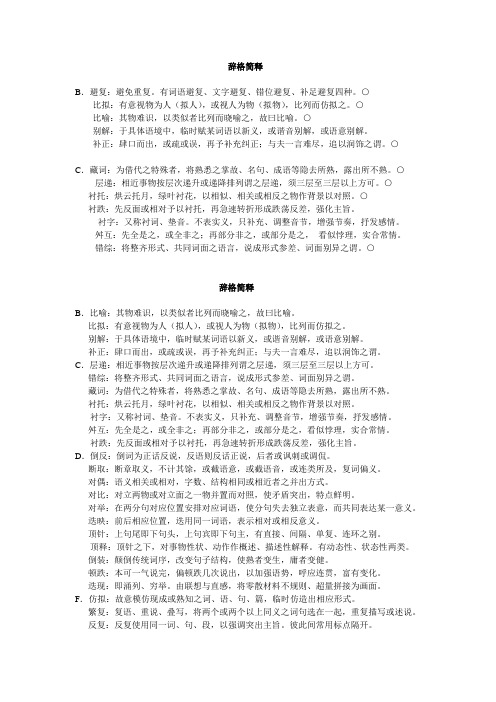
辞格简释B.避复:避免重复。
有词语避复、文字避复、错位避复、补足避复四种。
○比拟:有意视物为人(拟人),或视人为物(拟物),比列而仿拟之。
○比喻:其物难识,以类似者比列而晓喻之,故曰比喻。
○别解:于具体语境中,临时赋某词语以新义,或谐音别解,或语意别解。
补正:肆口而出,或疏或误,再予补充纠正;与夫一言难尽,追以润饰之谓。
○C.藏词:为借代之特殊者,将熟悉之掌故、名句、成语等隐去所熟,露出所不熟。
○层递:相近事物按层次递升或递降排列谓之层递,须三层至三层以上方可。
○衬托:烘云托月,绿叶衬花,以相似、相关或相反之物作背景以对照。
○衬跌:先反面或相对予以衬托,再急速转折形成跌荡反差,强化主旨。
衬字:又称衬词、垫音。
不表实义,只补充、调整音节,增强节奏,抒发感情。
舛互:先全是之,或全非之;再部分非之,或部分是之,看似悖理,实合常情。
错综:将整齐形式、共同词面之语言,说成形式参差、词面别异之谓。
○辞格简释B.比喻:其物难识,以类似者比列而晓喻之,故曰比喻。
比拟:有意视物为人(拟人),或视人为物(拟物),比列而仿拟之。
别解:于具体语境中,临时赋某词语以新义,或谐音别解,或语意别解。
补正:肆口而出,或疏或误,再予补充纠正;与夫一言难尽,追以润饰之谓。
C.层递:相近事物按层次递升或递降排列谓之层递,须三层至三层以上方可。
错综:将整齐形式、共同词面之语言,说成形式参差、词面别异之谓。
藏词:为借代之特殊者,将熟悉之掌故、名句、成语等隐去所熟,露出所不熟。
衬托:烘云托月,绿叶衬花,以相似、相关或相反之物作背景以对照。
衬字:又称衬词、垫音。
不表实义,只补充、调整音节,增强节奏,抒发感情。
舛互:先全是之,或全非之;再部分非之,或部分是之,看似悖理,实合常情。
衬跌:先反面或相对予以衬托,再急速转折形成跌荡反差,强化主旨。
D.倒反:倒词为正话反说,反语则反话正说,后者或讽刺或调侃。
断取:断章取义,不计其馀,或截语意,或截语音,或连类所及,复词偏义。
文言文翻译指导之二(常见修辞的翻译)
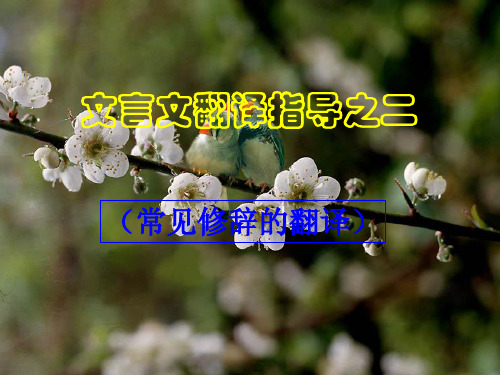
(五)合叙的翻译
合叙是把两件相关的事合在一起说, 翻译时为了不发生误解,应把他们分开 叙述。
如: 兵革非不坚利也。(《孟子》)
即“兵非不利也,革非不坚也”, 译为“武器不是不锋利,盔甲不是不坚 固”
(七)用典的翻译 古人为了使行文典雅,言简意丰, 常或明或暗地引用典故,在翻译时可 灵活处理,一般可译为这个典故所包 含的普遍意义。
如:
1、妾闻志士不饮盗泉之水,廉者不受 嗟来之食。 (《乐羊子妻》) 侮辱性的施舍
排比的翻译 例如: 有席卷天下,包举宇内,囊括四海之意,并吞八荒 之心。 (《过秦论》) 小结(浓缩法): 句子将一个意思从各方面加以铺陈,语意连贯, 气势阔大, 但现代汉语里找不到相应的词语一一对译,这时可 浓缩为: (秦国)有并吞天下,统一四海的雄心。
2、暗喻,译为“像XX一样+XX比喻义”。
用了比喻词的,仍译为暗喻 不用比喻词的,译为明喻。 如: 1、如今人方为刀俎,我为鱼肉。 2、古来万事东流水。 3、夫秦王有虎狼之心。 自古以来万事都像东去的流水一样; 秦王有像虎狼一样凶狠的心肠
现在人家是刀和砧板,我们是鱼和肉。
3、借喻
译为它所比喻的事物,即把喻体还原成本体。
1、肉食者鄙,未能远谋。《曹刿论战》 做官的人见识浅陋,不能做长远的打算。
2、沛公不胜杯杓,不能辞。《鸿门宴》
沛公承受不住酒力,不能前来告辞。 3、洎牧以谗诛,邯郸为郡。《六国论》
等到李牧因为谗言被杀害,赵国成 了秦国的一个郡……
(三)夸张的翻译 1、状态、程度方面的夸张,仍译 为夸张,前面加上“像要”或“快要”。 如: (1)相如因持璧却立,倚柱,怒发 上冲冠。《廉颇蔺相如列传》 蔺相如于拿着和氏壁退后站起来, 靠在柱子上,愤怒得头发像要《促织》 成名回头看到蟋蟀笼空着,就急得快 要出不来气,说不出话 。
辞格二 (2)
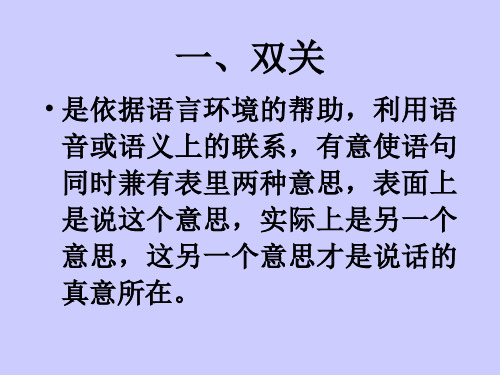
• 后来这终于从浅闺传进深闺里去了。
• 新闻——旧闻
三、反语
• 故意使用跟本来意思相反的词语 或句子来表达本意,这种辞格叫 反语。
反语的基本类型
• 1、以正当反:用正面的语句表达反面 的意思。 • 假若当时我已经能够记事儿,我必会把 联军的罪行写得更具体、更“ 伟大”、 更“文明”。 • 我忽又良心发现,而且增加勇气了,于 是点上一支烟,再继续写些为“正人 君 子”之流所深恶痛绝的文字。
一、双关
• 是依据语言环境的帮助,利用语 音或语义上的联系,有意使语句 同时兼有表里两种意思,表面上 是说这个意思,实际上是另一个 意思,这另一个意思才是说话的 真意所在。
• (一)双关的种类 • 1.谐音双关:凭借词语音同或音近的条件构 成的双关叫谐音双关。 • 我失娇杨君失柳,杨柳轻扬直上重霄九。
• 3月14日下午两点三刻,当代最伟大的 思想家停止思想了。让他一个人留在 房里还不到两分钟,等我们再进去的 时候,便发现他在安乐椅上安静的睡 着了——但已经是永远地睡着了。 • 审问没有多久,秘密警察弗立德里赫 很不小心地“碰”了我一下,我又在 昏迷中醒了回来。 • 你的个人问题怎么解决呀?
•
• (二)双关的修辞作用 • 1.表义含蓄曲折,可以借物抒情, 也可以咏物言志; • 2.使语言委婉形象,幽默风趣; • 3.还可以用来指桑骂槐,一般称 为对象双关。
• (三)双关的运用
• 1.谐音双关要注意用语音的相同或相 近关顾两重意思;寓意双关必须注意 “表”、“里”两重意义的内在联系, 二者联系越密切,修辞效果越好。 • 2.要注意双关和歧义的区别;
双关与反语
• 相同点:双关与反语相同之处都具有 双重意义,都是在特定的语境中体现 其真意。 • 区别:1、双关的双重意义有相反、 相同、相关的;反语的双重意义永远 是相关的。 • 2.双关的效果是含蓄委婉,反语的效 果是讽刺幽默。
第六章 修辞翻译
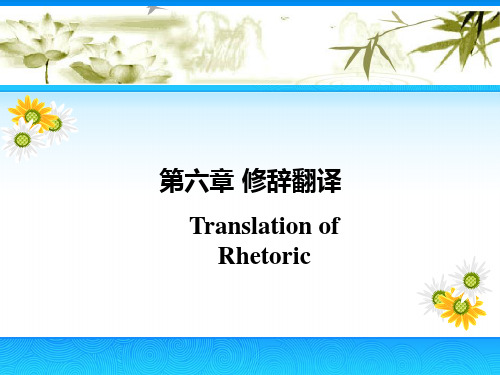
2. 添加形象意译 • He greeted me with a benumbed look. 他欢迎我时,一脸呆若木鸡的表情。
3. 替换或取消形象(具体情况具体分析) • He has a butterfly in his stomach. A. 他肚子里有只蝴蝶。 B. 他怀里像揣着兔子一般。 • Ass in the lion’s skin. A. 披着狮子皮的驴 B. 狐假虎威 • He speaks as if there were a frog in his throat. A. 他说话时好像有青蛙在嗓子里。 B. 他说话声音很沙哑。
辞格的翻译——拟人 Personification
• • • • 直译 Misfortunes never come single. 祸不单行。 Dawn was beginning to prowl about the sky and put out the stars. • 黎明悄悄来临,星星暗淡无光。
语气的处理
• Snobs talk as if they had begotten their own ancestors. A. 大言不惭,简直把祖宗也说成了自己的后 代。 B. 势利鬼大言不惭,似乎把他们的先人也能 说成是自己的后代。
• “Well, it’s my duty to help them out of it.” “It’s your duty to invite all the rats in the world to gnaw at your bones.” (D. H. Lawrence: Women in Love) A. “嘿——我有责任去帮助他们解脱困难。” “你还有责任去叫全世界的老鼠来啃你的骨头哩。 ” B. “唉——我该帮帮他们来解脱困难。” “你该把全世界的老鼠都叫来啃你的骨头才对!”
英语常用修辞格的翻译

省略;Ellipsis
eg:妈妈让他洗碗,她就不洗。 译文:Mother tells her to wash the dishes, but she will not(do it)
移就;Transferred Epithet
把本来用以修饰人的形容词移属于同人有关的抽象物 或具体物,这种貌似错误、实为妙用的修辞格叫做 “移就”(Transferred Epithet),它通过词语巧妙 的“移植”,来取得常规搭配所无法得到的效果。
转喻;Metonymy
Biblioteka eg: 秃头站在白背心的略略正对面,弯了腰, 去研究背心上的文字。(鲁迅:《示众》) 译文:Baldy,standing almost directly opposite White Jerkin,stooped to study the characters written on his jerkin. 有时采用意译更为合适 eg: 英雄所见略同。 译文:Great minds think alike.
递升;Climax
把事物按由小到大、由短到长、由低到高、由轻到重、由近 到远、由易到难、由浅到深等次序说下去,这种修辞手法叫 递升,英语里称作 climax。运用这一修辞手法,能够使要表 达的思想逐步加深、感情逐步强化,因而能增强语言的说服 力和感染力。 eg:事情就是这样,他来进攻,我们把他消灭了,他就舒服了。 消灭一点,舒服一点;消灭得多,舒服得多;彻底消灭,彻 底舒服。( 毛泽东:《关于重庆谈判》) 译文:This is the way things are:if they attack and we wipe them out,they will have that satisfaction;wipe out some,some satisfaction;wipe out more,more satisfaction;wipe out the whole lot,complete satisfaction.
辞格与翻译
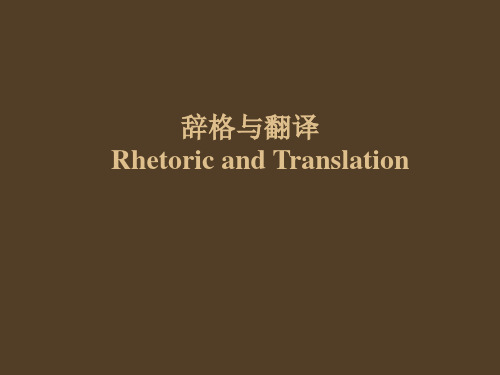
(4). 胆小如鼠 as timid as a rabbit (5). 虎头蛇尾 in like a lion, out like a lamb (6). 蠢得像猪 as stupid as a goose 3). 宗教信仰 (religion and faith) (1).菩萨心肠 God tempers the wind to the shorn lamb (天怜受难人;上帝使风轻拂剪过羊毛的小羊)
4. Factors
1. Geographical factors (地理环境因素)
(1). 过五关,斩六将 weather the storm (2). 了如指掌 know the ropes (3). 狗拿耗子—多管闲事 have an oar in every one’s boat (把桨放进每个人的船中) (4). 疾风知劲草 A good sailor is not known until the sea is rough and water deep.
A)、the container for the thing contained: The kettle is boiling=The water in the kettle is boiling. Please drink a cup or two=a cup of tea/wine. B). the instrument for the agent: The pen is stronger than the sword. Give every man thine ears, but few thy voice. C). the sign for the thing signified: Grey hair should be respected. His pen sways over half of the world. D). others: He has a ready tongue.=He is fluent and quick to answer questions. ) He is a reader of Chaucer.
辞格翻译translation of figures of speech

辞格翻译translation of figures of speech
虽然英、汉语的修辞格在分类和使用上有一定的相同或相似之处,但是由于英、汉民族在语言环境和美学观念上的不同,往往在表达同一概念时使用不同的修辞格;即使采用同一个修辞格,例如比喻,在结构方式、喻体、喻义以及运用范围上也不尽相同。
辞格翻译可分为三类:可译、难译、不能译。
可译者,常可采用对应的辞格,甚至相同的结构,例如排比、拟人和比喻常是可译的。
难译者,经常使用变通的手段,设法用彼一辞格译出此一辞格或用意译,如对偶、拟声、双关之类。
而涉及到不同文字字形结构或音韵方面的修辞格往往为不可译,只能另辟蹊径。
总之,不论哪一类,都应该采取恰当的、最接近原文的翻译方法,使原文中音、形、义的修辞效果尽可能完美地传达出来。
第二节修辞格的翻译 (1)

第二节修辞格的翻译英汉翻译中,修辞格的翻译往往比较棘手。
原因是英语修辞格一般都具有形式独特新异、内容形象丰富、功能生动鲜明等特点。
用汉语把所有这些要素都翻译出来自然比较困难。
这时就要坚持首先保证内容、其次尽量保留原文效果、最后力争形式妥贴的原则。
根据这一原则,修辞格的翻译一般有直译法、解释法、意译法、替换法等。
6.2.1直译法修辞格的翻译直译法应为首选。
例如下面一些句子:1. His present hunger awoke and gnawed at him.这会儿,他肚子里的饥饿又苏醒过来撕咬着他。
2. Of me, my mother would say, with characteristic restraint, "This bandit. He doesn't even have to open a book---'A' in everything. Albert Einstein the Second."至于我,母亲总是以特有的矜持说:"这小鬼头,他甚至连书本都不消打开──门门都是优秀,真是个活脱脱的爱因斯坦。
"3. The Dutchman was six-foot, a great, red-faced,hot-tempered trek-ox of a man.那荷兰人身高六英尺,大块头,红脸膛,暴脾气,简直是一头拉车的公牛。
4. The parental discipline can be described as cruel kindness.父母的惩戒可以说是残酷的仁慈。
5. Safety will be the sturdy child of terror, and survival the twin brother of annihilation.安全是恐怖的健壮婴儿,生存是毁灭的孪生兄弟。
6. The plays adapted from Greek tragedies and Shakespearean drama by Suzuki, although performed in Japanese, caused a big stir among the western audience with their strange and cruel beauty.铃木正改编自希腊悲剧和莎士比亚戏剧的剧作,虽然以日语演出,但那种奇异而残酷的美,却在西方观众中引起了轰动。
英语修辞格译法ppt课件

20
(三)句式修辞格(syntactical rhetorical devices)
句子结构上的修辞格主要是指通过句子结构的 布局或变化来达到一定的修辞手法。这类辞格 主要包括 repetition反复, rhetorical question设问, antithesis对偶, apostrophe倒装,parallelism排比, climax层递 等。例如:
(转喻),transferred epithet(转移修饰),
personification(拟人), hyperbole(夸张),
irony(反语), euphemism(委婉语), pun(双
关), oxymoron(矛盾修辞法), zeugma(轭式
搭配法), contrast (对照)等。
8
(1)The baby was brought up on the bottle.
这个婴儿是喝牛奶或羊奶长大的。(metonymy── 用奶瓶代奶)
(2)Some mute inglorious Milton here may rest.
某个沉默的、无名诗人也许在此长眠。
(antonomasia──用米尔顿代诗人)
6
Assonance是在一句话或在一个诗行中间,有两 个或更多的词具有相同的元音。例如:
With this faith we will be able to hew out of the mountain of despair a stone of hope. 怀着这个信念,我们能把绝望的大山凿成希望 的磐石。
sweet sorrow 忧喜参半 (不是甜蜜的悲伤); proud humility 不卑不亢 (不是骄傲的谦卑)
22个辞格的名词解释

22个辞格的名词解释辞格是汉语中非常重要的一种语法现象,它关系到句子的语法结构和表达方式。
在汉语中,共有22个辞格,分别是主谓结构、主谓补结构、主谓宾结构、主谓宾补结构、主谓双宾结构、主谓宾宾补结构、并列结构、倒装结构、省略结构、独立结构、插入结构、标记结构、重复结构、异化结构、复句关系结构、并列句关系结构、条件句关系结构、比较句关系结构、让步句关系结构、目的句关系结构、样貌句关系结构、因果句关系结构。
主谓结构是最基本的辞格,由主语和谓语构成,主语是句子的动作的执行者或者是句子的主体,谓语则是说明主语动作的部分。
例如,句子"小明吃蛋糕"中,"小明"是主语,"吃"是谓语。
主谓补结构是在主谓结构的基础上,再加上一个补语,补语可以是名词、形容词或者动词,用来对主语进行补充说明。
例如,句子"小明是医生"中,"小明"是主语,"是"是谓语,"医生"是主谓补结构。
主谓宾结构是主谓结构中,加上一个宾语,用来表示动作的承受者或者是动作的对象。
例如,句子"小明喝水"中,"小明"是主语,"喝"是谓语,"水"是宾语。
主谓宾补结构是主谓宾结构的进一步扩展,通过在宾语后加上一个宾语补语,来补充说明宾语的状态或者性质。
例如,句子"我听到他唱歌"中,"我"是主语,"听到"是谓语,"他"是宾语,"唱歌"是宾语补语。
主谓双宾结构是主谓结构中,加上两个宾语,一个表示动作的直接对象,一个表示间接对象。
例如,句子"我给你书"中,"我"是主语,"给"是谓语,"你"是间接宾语,"书"是直接宾语。
辞格与翻译

1.3 句式修辞格
句式修辞格是指通过句子结构的布局 或变化来达到一定的修辞效果。 或变化来达到一定的修辞效果。
这类修辞格主要包括repetition(反复), 这类修辞格主要包括 (反复) antithesis(对偶), parallelism(排 (对偶) ( 比), anastrophe(倒装), climax(层 (倒装) ( 递 ) 等。
Euphemism:
plumy 丰满的 stout 壮实的
用比较温和的词代替粗鲁的词, 用比较温和的词代替粗鲁的词, 3. Poor 贫穷 用通行的词代替禁忌的词。 用通行的词代替禁忌的词。 ——needy 贫困 The indigent 贫困
例:Beware Metonymy: of the bottle. It is a figure of speech that 谨防喝醉酒。 谨防喝醉酒。 has to do with the substitution of the name of one thing for that of another.
www,
1.2 词义修辞格
Personification
Synecdoche:
It involves the substitution of the part for the whole, or the whole for the part.
It gives human form or feeling to animals, or life and attributes to inanimate objects, or to ideas and abstractions. How soon hath Time, the subtle thief of youth, stolen on his wing my Three and twentieth year!
英语常用修辞格的翻译分析

quiet, light, fresh ,blind, clear, stubborn, cunning, old ,slippery, busy
明喻 Simile
英语中的simile和汉语明喻基本格式相同,一般情况下,可以照直翻译。as busy as bee 像蜜蜂一样忙碌as brave as lion 像狮子一样勇猛as black as crow 像乌鸦一般黑as sharp as knife 像刀一样锋利
英语比喻美感的再现应以比喻内容为基础,发掘比喻美的真正所在,同时致力于形式的表现,尽可能用“形神兼备”的翻译来传神达意。在实在不可能“形似”时,要在“神似”的条件下,竭力用其它方法和手段表现出原比喻的意之真谛、美之内涵。依据这一原则,可采用以下方法:
1 go to sleep in the presence of Mrs. General and blood was to change to milk and water. (Dickens. Little Dorrit) 在杰纳勒尔夫人跟前,一个人的激情会变得麻木不仁,热血也会变成掺了水的牛奶。
少时所学,到老不忘。我赚的不够吃。当我发了财时,我要到非洲去。每个人的生活都有甜有苦。
直译+意译法
1. Most of us are too ready to apply to others the cold wind of criticism, we are somehow reluctant to give our fellows the warm sunshine of praise. 我们中的很多人太容易给别人批评的冷风,而不愿意给自己的同伴赞扬的阳光。2. Men are April when they woo, December when they wed, maids are May when they maids, but the sky changes when they are wives. (Shakespeare) 男人求爱时如和煦的4月,婚后却像寒冬腊月;闺中少女则宛若温暖的5月,而为人妇后却像易变的天气阴晴莫测。
【精品】修辞格的译法PPT课件

C. 释义 由于许多英语修辞手法或比喻形象本身是特有的,如保留其形就会危害其义。这时就必须 首先保证译文能正确传达原文的思想内容。例如:
瞧着吧, 不管什么女人钓他, 他就会上钩。(拟物)
B. 加注 加注既能传达原文的意思和神韵, 又能扩展读者的知识面。尤其当原文所用的 典故在上下文中起比较重要的作用时,使用加注能收到较好的效果。例如:
(1) Christ, to hear some of those sailors' myths, you'd think bloody Fort Knox was on every ship that sailed.
D. 归化 有些英语的修辞格译成汉语时,可以换用符合汉语习惯的其他辞格或是改变原文中比喻 形象,使译文在思想上忠实于原作、风格和神韵上尽量求得与原文相接近的效果。例如: (1) He was so fond of talking that his comrades nicknamed him “magpie”. 他如此唠叨,同伴们给他起了个“麻雀”的外号。 (2) “Don‘t be scared, chickens!” came her voice with teasing gaiety.
天 (注:诺克斯堡是美国的一个军事保留地,是美国黄金仓库的所在地。) (2) They did not reopen the Pandora's Box they had peeked into in 1972. 他们在1972年曾挖掘过这些丑事,如今却不再打开这个潘朵拉的盒子。 (注:潘朵拉的盒子原自希腊神话故事,里面藏有许多能给人们带来不幸的事 物。)
常用英语修辞格的翻译PPT文档共70页

51、没有哪个社会可以制订一部永远 适用的 宪法, 甚至一 条永远 适用的 法律。 ——杰 斐逊 52、法律源于人的自卫本能。——英 格索尔
53、人们通常会发现,法律就是这样 一种的 网,触 犯法律 的人, 小的可 以穿网 而过, 大的可 以破网 而出, 只有中 等的才 会坠入 网中。 ——申 斯通 54、法律就是法律它是一座雄伟的大 夏,庇 护着我 们大家 ;它的 每一块 砖石都 垒在另 一块砖 石上。 ——高 尔斯华 绥 55、今天的法律未必明天仍是法律。 ——罗·伯顿
6、最大的骄傲于最大的自卑都表示心灵的最软弱无力。——斯宾诺莎 7、自知之明是最难得的知识。——西班牙 8、勇气通往天堂,怯懦通往地狱。——塞内加 9、有时候读书是一种巧妙地避开思考的方法。——赫尔普斯 10、阅读一切好书如同和过去最杰出的人谈话。——笛卡儿
Thank you
《常见的修辞格翻译》课件

忠实原文的考虑
总结词
在修辞格翻译中,应尽可能忠实原文,保留修辞格的原有风格和韵味。
意译法
总结词
摆脱原文修辞格的束缚,传达原文的意义
详细描述
意译法是指摆脱原文修辞格的束缚,以传达原文意义为主,不拘泥于原文修辞格的形式。当原文的修 辞格比较复杂或难以理解时,意译法是一种更为灵活的翻译方法。在采用意译法时,译者应注重传达 原文的意义和精神,而不是拘泥于修辞格的表面形式。
增译法
总结词
拟人
总结词
将非人的事物赋予人的特征或情 感。
详细描述
拟人是将非人类的生物、事物或 抽象概念赋予人的特性或情感, 使其更具有人性化的表现。例如 ,“那朵花在微风中微笑着。”
夸张
总结词
通过夸大或缩小事物的特征来强调情 感或效果。
详细描述
夸张是一种修辞手法,通过夸大或缩 小事物的特征、数量、程度等,以强 调所要表达的情感或效果。例如,“ 他的歌声响彻云霄。”
增加必要的解释或说明,帮助读者理解 修辞格的含义
VS
详细描述
增译法是指在翻译过程中增加必要的解释 或说明,以帮助读者更好地理解修辞格的 含义。当原文的修辞格比较特殊或难以理 解时,增译法可以帮助读者更好地理解原 文的含义。通过增加适当的解释或说明, 译者可以弥补修辞格在目的语中的文化缺 失,使译文更加完整和易于理解。
排比
总结词
用三个或以上结构相似的句子来表达思想或情感。
详细描述
排比是一种修辞手法,通过使用三个或以上结构相似、意义相近的句子,来加强 语势和表达效果。例如,“我爱生活,我爱音乐,我爱大自然。”
第二节 修辞格的翻译
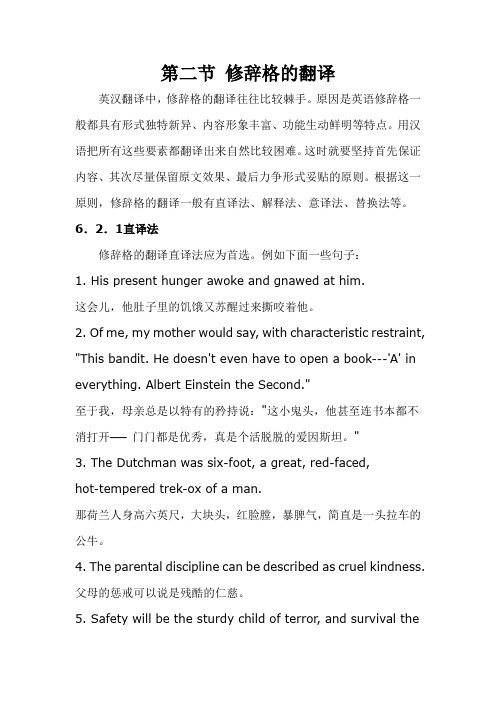
第二节修辞格的翻译英汉翻译中,修辞格的翻译往往比较棘手。
原因是英语修辞格一般都具有形式独特新异、内容形象丰富、功能生动鲜明等特点。
用汉语把所有这些要素都翻译出来自然比较困难。
这时就要坚持首先保证内容、其次尽量保留原文效果、最后力争形式妥贴的原则。
根据这一原则,修辞格的翻译一般有直译法、解释法、意译法、替换法等。
6.2.1直译法修辞格的翻译直译法应为首选。
例如下面一些句子:1. His present hunger awoke and gnawed at him.这会儿,他肚子里的饥饿又苏醒过来撕咬着他。
2. Of me, my mother would say, with characteristic restraint, "This bandit. He doesn't even have to open a book---'A' in everything. Albert Einstein the Second."至于我,母亲总是以特有的矜持说:"这小鬼头,他甚至连书本都不消打开──门门都是优秀,真是个活脱脱的爱因斯坦。
"3. The Dutchman was six-foot, a great, red-faced,hot-tempered trek-ox of a man.那荷兰人身高六英尺,大块头,红脸膛,暴脾气,简直是一头拉车的公牛。
4. The parental discipline can be described as cruel kindness. 父母的惩戒可以说是残酷的仁慈。
5. Safety will be the sturdy child of terror, and survival thetwin brother of annihilation.安全是恐怖的健壮婴儿,生存是毁灭的孪生兄弟。
6. The plays adapted from Greek tragedies and Shakespearean drama by Suzuki, although performed in Japanese, caused a big stir among the western audience with their strange and cruel beauty.铃木正改编自希腊悲剧和莎士比亚戏剧的剧作,虽然以日语演出,但那种奇异而残酷的美,却在西方观众中引起了轰动。
- 1、下载文档前请自行甄别文档内容的完整性,平台不提供额外的编辑、内容补充、找答案等附加服务。
- 2、"仅部分预览"的文档,不可在线预览部分如存在完整性等问题,可反馈申请退款(可完整预览的文档不适用该条件!)。
- 3、如文档侵犯您的权益,请联系客服反馈,我们会尽快为您处理(人工客服工作时间:9:00-18:30)。
• 译文三:落败孤岛孤败落。/若非孤岛孤非若。 (马红军)
• 雾锁山头山锁雾,天连水尾水连天。(厦门 鼓浪屿)
下周作业
3) The diamond department was the heart and center of the store. (metaphor) 钻石部是商店的心脏和核心。
4) 说话是银,沉默是金。
Speech is silver while silence is gold.
5) No cross, no crown. (metonymy) 不经磨难, 就没有成功。(无苦就无乐。)
哈姆雷特:没雨,陛下,日子过得很红火。
• 我失骄杨君失柳,杨柳轻飏直上重霄九。 (毛泽东《蝶恋花—答李淑一》)
• 译文一:I lost my proud poplar and you your
willow. Poplar and willow soar to the Ninth Heaven. (官译本)
6) Sometimes the pen may be mightier than the sword. (synecdoche) 有时笔比剑更有力量。
7) 我正在读莎士比亚呢。
I am reading Shakespeare.
8) This diligent student seldom reads more than an hour per month.(irony) 这个勤奋的学生每个月读书时间不超过一 小时。
胆小如鼠;
犟得像头牛
as strong as a horse 健壮如牛 (“健壮如马”)
like a duck to water如鱼得水(“如鸭子得水”)
like a drowned rat 像落汤鸡(“像落水的老 鼠”)
hungry as a bear 像只饿狼(“像头饿熊”)
as poor as a church mouse 一贫如洗
Eg. 1) Books, like friends, should be few and well chosen. (simile) 书籍如朋友, 宜少而精。
2) 过去的经历总像图片一样在脑海中萦绕。
What has been experienced in the past has always looming in memory like a picture.
3) ……无论你所做的事是文化还是武化。 (鲁迅)
…no matter whether you are resorting to civili个词同时表达双重意思,谐音双关;语 义双关(英语常用语义双关,汉语常用谐音双关)
Eg. 1)—Why do you say the river is rich?
我总算弄明白政府是怎样工作的了。参议院从众议 院那里得到提案,总统又从参议院那里得到提案, 最后由我们承担一切费用。(注:…)
3) —What flowers does everybody have?
—Tulips. (two lips)
• King:…Hamlet, and my son…how is it that the clouds still hang on you?
That's sweetly played in tune. (A Red,
Red Rose by Robert Burns)
• 译文一:啊,我的爱人象红红的玫瑰, 在六月里苞放; 啊,我的爱人象一支乐曲, 乐声美妙、悠扬。 (无名译)
• 译文二:呵,我的爱人像朵红红的玫瑰, 六月里迎风初开; 呵,我的爱人像只甜甜的曲子, 奏得和谐又合拍。 (王佐良译)
白)
My whitening hair would make a long long rope
Yet could not fathom all my depth of woe.
三、意译法
在许多情况下,因为两个民族的生活 环境、风俗习惯、思维方式和美学 观的差异,以及对于某些英语中常 用而汉语中不用或罕用的修辞格, 需要采取意译的办法,准确表达原 文的思想和精神。
11) She was eaten up with jealousy. (hyperbole) 她妒火中烧。
12) 千山鸟飞绝,万径人踪灭。(《江雪》柳宗 元)
A hundred mountains and no bird
A thousand paths without a footprint. 13) 白发三千丈,缘愁似个长。(《秋浦歌》李
• 句法辞格:通过句子结构的均衡分布或是突出 重点创造出来的修辞手法,主要包括反复 (repetition),设问(rhetorical questions),对偶 (antithesis),排比(parallelism),倒装 (anastrophe)等。
二、直译法
对于英汉两种语言中相类似的常用修 辞格,在翻译中当然应当尽可能采 用直译的方法,即在用词和修辞结 构上都与原文保持一致,做到形神 皆似。
• 译文三:颖颖赤墙靡,首夏初发苞。 恻恻清商曲,眇音何远姚。(苏曼殊译)
注:颖颖(红光闪耀的样子)、墙靡 (蔷薇)、恻恻(悲伤)
• 译文四:卿若红玫瑰,新绽六月里, 更若旋律曲,嘹亮声和谐。(周宜乃译)
一、修辞简介
• Figures of speech are ways of making our language figurative. When we use words in other than their ordinary or literal sense to lend force to an idea, to heighten effect, or to create suggestive imagery, we are said to be speaking or writing figuratively.
• 译文二:You lost your darling Willow and I
my Poplar proud. Both Poplar and Willow soar gracefully far above the cloud. (辜正坤 译)
• 译文三:You’ve lost your Willow and I’ve
• 本义就是修饰言论,也就是在使用语 言的过程中,利用多种语言手段以收 到尽可能好的表达效果的一种语言活 动。
• 英汉语言中有相同的修辞格,也有不 同之处。
辞格的种类
• 音韵辞格:利用词语的语音特点创造出来的修 辞手法:头韵(alliteration),尾韵(rhyme),拟 声(onomatopoeia)
3) She opened the door and her heart to the homeless boy. 她为这个无家可归的孩子打开了大门,也敞 开了自己的心扉。
2. 英语中alliteration是在一句话中,或一个诗行中 用了几个以同样字母开头的词;尾韵(rhyme)则是 相同字母结尾的词。
I feel so sad, so drear, So lonely, without cheer. (许渊冲)
4) When the cat’s away, the mice will play. 猫儿不在,老鼠作怪。
3. 转换比喻形象
timid as a rabbit; as stubborn as a mule
lost my Poplar proud. Their souls ascend the highest heaven. (许渊冲译)
• 回文palindrome
• Able was I ere I saw Elba. (Napoleon) • 译文一:我在看见厄尔巴岛之前曾是强有力
的。(钱歌川)
• 词义辞格:借助语义的联想和语言的变化等特 点,主要包括明喻(simile),暗喻(metaphor), 借喻(metonymy),借代(synecdoche) ,拟人 (personification),夸张(hyperbole),反语 (irony),委婉语(euphemism),双关(pun),矛 盾修辞法(oxymoron),轭式搭配法(zeugma)等
Hamlet: Not so, my Lord. I’m too much in the sun. (Hamlet by Shakespeare)
• 译文一:国王:我的侄儿哈姆雷特,我的孩 子……为什么愁云依旧笼罩在你的身边? 哈姆雷特:不,陛下,外面的阳光晒得我红 光满面。(朱生豪译)
• 译文二:国王:哈姆雷特,我的儿子,为何 眉宇紧锁乌云密布?
3) On the 14th of March, at a quarter to three in the afternoon, the greatest living thinker ceased to think.
3月14日下午两点三刻,这个最伟大的 思想家停止了思考。
5.仿拟/仿词parody:有意仿照熟知的现成 的语言材料,产生出人意料的效果。
第二讲 辞格的翻译 The Translation of Figure of
Speech
张伟红 2011-2-24
张伟红
• O my luve is like a red, red rose,
That's newly sprung in June;
O my luve is like the melodie,
Eg. 1) He is all fire and fight. 他怒气冲冲,来势汹汹。
2) Penny wise, pound foolish. 拣了芝麻,丢了西瓜。
3) 寻寻觅觅,冷冷清清,凄凄惨惨戚戚。(李清照 《声声慢》)
